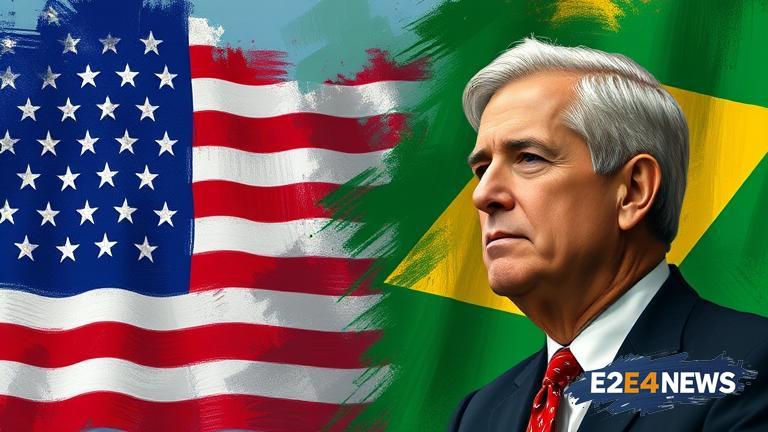The United States has imposed a 40% tariff on Brazil, citing the country’s alleged persecution of its former president as the reason behind the move. The decision is seen as a significant escalation of trade tensions between the two nations. The US government has accused Brazil of conducting a ‘witch hunt’ against its former president, with the aim of undermining the country’s democratic institutions. The tariff is expected to have a significant impact on Brazil’s economy, particularly on its steel and aluminum industries. The move has been met with widespread criticism from Brazilian officials, who have denounced the US action as ‘unfair’ and ‘unjustified’. The Brazilian government has vowed to take retaliatory measures against the US, which could further escalate the trade dispute. The US has been critical of Brazil’s handling of the case against its former president, with many viewing it as a politically motivated attack. The former president has been accused of corruption and other crimes, but his supporters argue that the charges are baseless and designed to discredit him. The US has a long history of imposing tariffs on countries it accuses of unfair trade practices, but this move is seen as particularly aggressive. The tariff is expected to remain in place until Brazil takes steps to address the US concerns about the treatment of its former president. The Brazilian government has argued that the US has no right to interfere in its internal affairs, and that the tariff is an attempt to exert pressure on the country. The move has sparked concerns about the potential impact on the global economy, particularly in the steel and aluminum sectors. The US is one of Brazil’s largest trading partners, and the tariff could have significant consequences for the country’s economy. The Brazilian government has urged the US to reconsider its decision and engage in diplomatic efforts to resolve the dispute. The US has shown no signs of backing down, however, and the tariff is expected to remain in place for the foreseeable future. The move has been seen as a significant escalation of the trade tensions between the US and Brazil, and has raised concerns about the potential for further retaliation. The US has been accused of using tariffs as a tool to exert pressure on other countries, and this move is seen as a prime example of this strategy. The Brazilian government has vowed to defend its interests and take all necessary measures to protect its economy. The US has argued that the tariff is necessary to protect its own interests and ensure that Brazil is held accountable for its actions. The move has sparked a heated debate about the use of tariffs as a tool of trade policy, with some arguing that they are a necessary measure to protect domestic industries, while others see them as a form of economic coercion. The US and Brazil have a long history of trade relations, but this move has raised concerns about the potential for a significant deterioration in relations between the two countries. The tariff is expected to have a significant impact on the global economy, particularly in the steel and aluminum sectors, and has raised concerns about the potential for a trade war. The US has shown no signs of backing down, and the tariff is expected to remain in place until Brazil takes steps to address the US concerns about the treatment of its former president.
